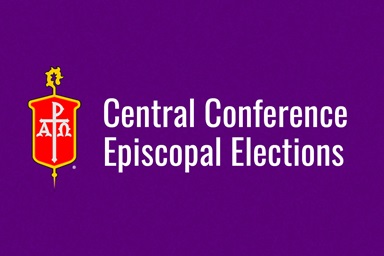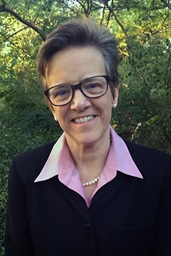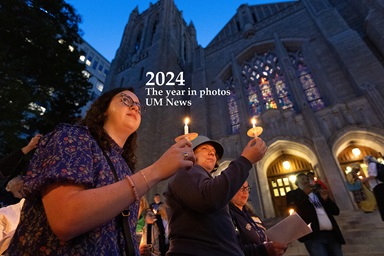A roundtable appointed to find a way forward for The United Methodist Church in Germany has proposed deleting all Book of Discipline passages about the ordination of homosexual clergy and the blessing of same-sex partnerships.
The group, appointed last year after the German church’s executive committee said stipulations in the Traditional Plan approved by General Conference 2019 were unacceptable, has also suggested the formation of an association that maintains the Book of Discipline bans on ordaining openly gay clergy or blessing same-sex marriages. The group’s report said such an association would offer a home for those with traditional, conservative positions.
 Members of the roundtable, made up of representatives from all three annual conferences in the German Central Conference, were unanimous in approving the proposals at the group’s fourth meeting Jan. 10-11.
Members of the roundtable, made up of representatives from all three annual conferences in the German Central Conference, were unanimous in approving the proposals at the group’s fourth meeting Jan. 10-11.
Germany Area Bishop Harald Rückert, who chaired the roundtable, said the focus of the meetings was always “prayer and alignment with God.”
“The talks were good, honest, and occasionally tough, but they were in Christian friendliness and characterized by responsibility for our church. This is how fair and respectful wrestling in the spirit of the gospel can look like among Christians,” he said.
“If you take a closer look, the result will probably not make anyone really happy. For me, however, this is precisely an indication that we are on the right track. If it were different, there would be winners and losers,” Rückert said.
The proposals will now be presented to the district assemblies and annual conferences in Germany, then before the full central conference in Zwickau in November 2020 for a vote. Germany and other central conferences may adapt The Book of Discipline for their ministry context.
The report — written by two members of the roundtable, Steffen Klug and Stephan von Twardowski — noted that those meetings will happen amid international developments in The United Methodist Church. Rückert also mentioned the proposal recently made by an international group regarding separation of the church. General Conference will discuss that plan and others in May 2020.
Alexandra Brenner of Bietigheim-Bissingen, one of the traditionalist members of the roundtable, said she attached a quote, “Let the Holy Spirit serve you,” to her workbook. She said that helped her “to develop a deep peace for the process.”
She said she was able to stop seeing others as opponents and view them as “as counterparts with wishes and needs,” which she said was a wonderful gift to perceive during the process.
“Now this attitude has to be transported to the congregations, annual conferences, the central conference and up to the General Conference,” she said.
The Rev. Lothar Elsner, theological director of the Bethanien Deaconess Foundation in Frankfurt and a Stuttgart resident, said that the last hour of the negotiation was “very moving for me.”
“At lunchtime, it still looked like we could not make a joint proposal. Then there was movement and a clear approach. Demands were dropped, additional bridges were built. Within an hour, we were able to clear the remaining obstacles in tough, concentrated and fair negotiations. I experienced that as a special moment of the Holy Spirit, of unity, and of reconciliation,” Elsner said.
The report said a working group will clarify some details, including the form of the association and the association’s name.
Before approving any proposals, members of the roundtable considered about 200 responses sent in by individuals, groups and congregations of The United Methodist Church in Germany.
“Because of the clear disagreement in the basic convictions about questions of homosexuality, the members of the roundtable propose to delete all passages that speak about the ordination of people with homosexual orientation and the blessing of same-sex partnerships. Every phrase in each sentence here was considered with much diligence. No other wording has been added instead. With regard to ordination, the Board of Ordained Ministry would still have the task of examining all candidates concerning their basic suitability. The deletions in the Book of Discipline would neither prescribe nor prohibit blessings of same-sex couples. Church councils should be able to discuss blessings of same-sex couples in their own churches and can make decisions,” the report said.
The report said the proposed association, with its own theological statement, “should give its members security in their beliefs and actions.” The association is open to districts, charges, congregations and individuals. “It will choose a leadership team, and the leader will be in close contact with the church leadership. Congregations should be able to vote if they would like to join such an association,” the report said.
The report said the 15 hours of the meeting were “characterized by an intensive struggle: How and in what way do we stay true to the word of God? How do we protect and accompany people in their identity without hurting them? How can we at the same time and as far as possible in our different convictions preserve the unity of the church and of congregations? The future will show if the hard work of the Round Table opens up horizons for this and is sustainable. We may, however, pray for it.”
Ruof is the communicator for the Germany Central Conference. UM & Global’s David W. Scott translated Ruof’s article from German.
The group, appointed last year after the German church’s executive committee said stipulations in the Traditional Plan approved by General Conference 2019 were unacceptable, has also suggested the formation of an association that maintains the Book of Discipline bans on ordaining openly gay clergy or blessing same-sex marriages. The group’s report said such an association would offer a home for those with traditional, conservative positions.

A group appointed to help The United Methodist Church in Germany deal with differences over homosexuality has proposed deleting passages about ordination of LGBTQ clergy and blessing of same-sex marriages from the Book of Discipline during a meeting in Fulda, Germany. Photo by Klaus U. Ruof, Communication UMC Germany.
Germany Area Bishop Harald Rückert, who chaired the roundtable, said the focus of the meetings was always “prayer and alignment with God.”
“The talks were good, honest, and occasionally tough, but they were in Christian friendliness and characterized by responsibility for our church. This is how fair and respectful wrestling in the spirit of the gospel can look like among Christians,” he said.
“If you take a closer look, the result will probably not make anyone really happy. For me, however, this is precisely an indication that we are on the right track. If it were different, there would be winners and losers,” Rückert said.
The proposals will now be presented to the district assemblies and annual conferences in Germany, then before the full central conference in Zwickau in November 2020 for a vote. Germany and other central conferences may adapt The Book of Discipline for their ministry context.
The report — written by two members of the roundtable, Steffen Klug and Stephan von Twardowski — noted that those meetings will happen amid international developments in The United Methodist Church. Rückert also mentioned the proposal recently made by an international group regarding separation of the church. General Conference will discuss that plan and others in May 2020.
Alexandra Brenner of Bietigheim-Bissingen, one of the traditionalist members of the roundtable, said she attached a quote, “Let the Holy Spirit serve you,” to her workbook. She said that helped her “to develop a deep peace for the process.”
She said she was able to stop seeing others as opponents and view them as “as counterparts with wishes and needs,” which she said was a wonderful gift to perceive during the process.
“Now this attitude has to be transported to the congregations, annual conferences, the central conference and up to the General Conference,” she said.
The Rev. Lothar Elsner, theological director of the Bethanien Deaconess Foundation in Frankfurt and a Stuttgart resident, said that the last hour of the negotiation was “very moving for me.”
“At lunchtime, it still looked like we could not make a joint proposal. Then there was movement and a clear approach. Demands were dropped, additional bridges were built. Within an hour, we were able to clear the remaining obstacles in tough, concentrated and fair negotiations. I experienced that as a special moment of the Holy Spirit, of unity, and of reconciliation,” Elsner said.
The report said a working group will clarify some details, including the form of the association and the association’s name.
Before approving any proposals, members of the roundtable considered about 200 responses sent in by individuals, groups and congregations of The United Methodist Church in Germany.
“Because of the clear disagreement in the basic convictions about questions of homosexuality, the members of the roundtable propose to delete all passages that speak about the ordination of people with homosexual orientation and the blessing of same-sex partnerships. Every phrase in each sentence here was considered with much diligence. No other wording has been added instead. With regard to ordination, the Board of Ordained Ministry would still have the task of examining all candidates concerning their basic suitability. The deletions in the Book of Discipline would neither prescribe nor prohibit blessings of same-sex couples. Church councils should be able to discuss blessings of same-sex couples in their own churches and can make decisions,” the report said.
The report said the proposed association, with its own theological statement, “should give its members security in their beliefs and actions.” The association is open to districts, charges, congregations and individuals. “It will choose a leadership team, and the leader will be in close contact with the church leadership. Congregations should be able to vote if they would like to join such an association,” the report said.
The report said the 15 hours of the meeting were “characterized by an intensive struggle: How and in what way do we stay true to the word of God? How do we protect and accompany people in their identity without hurting them? How can we at the same time and as far as possible in our different convictions preserve the unity of the church and of congregations? The future will show if the hard work of the Round Table opens up horizons for this and is sustainable. We may, however, pray for it.”
Ruof is the communicator for the Germany Central Conference. UM & Global’s David W. Scott translated Ruof’s article from German.
Like what you're reading? Support the ministry of UM News! Your support ensures the latest denominational news, dynamic stories and informative articles will continue to connect our global community. Make a tax-deductible donation at ResourceUMC.org/GiveUMCom.



